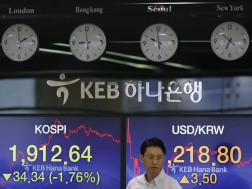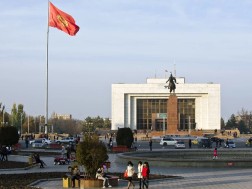South Korea at times has been referred to as the “impossible country” with a great stock market and a so-called Korea discount.
While the developments of President Yoon Seok Yul martial law declaration and demonstrations in Seoul flashed on TV screens, global investors focused again on the economic miracle of the Han River.
Half a century ago, South Korea was one of the poorest countries on the planet, and nobody would have predicted that it would conjure up an economic miracle. Today South Korea is one of the world's largest economies, making its stock market, particularly the KOSPI (Korea Composite Stock Price Index), a major player in the global financial landscape. The country is increasingly the global leader in the industries of the future including AI and EV as well as creative industries and cultural exports.
EWY iShares MSCI South Korea ETF (EWY) the New York listed country ETF closed the eventful week at USD 54.9 and Samsung Electronics London listed GDRs closed the week at USD 946. Dollar Won USD/KRW closed at 1424 levels. South Korea valuations in terms of P/E are at 11.39 and a market 12month dividend yield of 2.25%.
South Korea or ROK (Republic of Korea) at times has been called republic of Samsung.
Blue chip and iconic south Korean company Samsung electronics trades at 11.4x P/E and a dividend yield of 2.67%. Current analyst consensus ratings stand at BUY 88.1% and hold 11.9% with SELL recommendations at 0%. The 12-month fundamental analyst target price on the stock of KRW 140329 implies(potential) return of+159.4% from current levels.
The recent political developments in ROK republic of Korea might lead the global markets and investors again to the question of what is or was the “Korea discount”.
South Korea was among the poorest nations in the world in the aftermath of the Korean War (1950–1953). During the 1950s and early 1960s, South Korea's economy was in a dire state, characterized by widespread poverty, a lack of industrial development, and heavy dependence on foreign aid.
South Korea currently ranks 12th in the world for nominal GDP, with an economy valued at approximately $2.07 trillion as of 2024. In terms of GDP per capita, the country ranks around 29th globally, with a nominal GDP per capita of about $40,287.
The Korea Discount refers to the phenomenon where South Korean stocks, companies, and other assets trade at lower valuations compared to their global peers, even when the fundamentals (like earnings, growth prospects, and financial health) are strong. This discount affects South Korea's financial markets, making its companies appear undervalued by global standards.
Causes of the Korea Discount
Geopolitical Risks:
The constant tension with North Korea creates uncertainty that deters international investors.
Corporate Governance Issues:
Weak shareholder rights, lack of transparency, and the dominance of family-run conglomerates (chaebols) lead to concerns about mismanagement or conflicts of interest.
Regulatory and Market Factors:
Perceived inefficiencies in South Korea’s capital markets, high taxes on dividends, and restrictions on foreign investors contribute to reduced interest from global investors.
Cultural Factors:
A lack of focus on shareholder returns (like dividends or buybacks) compared to reinvestment in the business can make South Korean companies less attractive to investors looking for immediate returns.
Global Perception:
South Korea is often lumped with emerging markets despite being a developed economy, which can lead to biases and lower valuation multiples.
Why It Matters
Impact on Companies:
Lower valuations make it harder for South Korean firms to raise capital, expand internationally, or pursue mergers and acquisitions at competitive prices.
National Economy:
A lower stock market valuation reduces the wealth effect for South Korean households, potentially impacting consumption and economic growth.
Global Investment:
The discount deters global institutional investors from entering South Korea’s markets, limiting the country’s ability to integrate more deeply with global financial systems.
Reform Catalyst:
The Korea Discount has spurred calls for corporate governance reforms, tax incentives, and measures to address geopolitical risks. Some companies have taken steps like increasing dividends or improving transparency to attract foreign investment.
Recent Developments
In recent years, there has been growing attention to closing the Korea Discount. Efforts like improving shareholder rights, promoting ESG (Environmental, Social, and Governance) practices, and South Korea’s increasing focus on technology innovation are seen as potential ways to reduce the gap. However, addressing long-standing geopolitical and structural issues remains a significant challenge.
Yoon Suk-Yeol’s declaration of martial law on December 3, 2024, has exacerbated South Korea's "Korea discount," a term used to describe the undervaluation of South Korean assets in global markets. The move, although brief and quickly reversed, caused significant turmoil, including political instability, damage to investor confidence, and concerns over South Korea's democratic stability.
The martial law declaration, seen as a dramatic overreach, prompted immediate backlash from domestic and international stakeholders. It disrupted market sentiment, leading to a decline in the value of South Korea's currency, the won, and volatility in stock markets. Investors interpreted the action as a signal of political unpredictability, adding another layer of risk to investing in South Korea. This aligns with broader structural concerns such as governance issues, chaebol dominance, and geopolitical tensions that already contribute to the Korea discount.
In summary, the declaration of martial law has intensified existing challenges associated with the Korea discount by highlighting risks that deter long-term investments.
The "impossible country" narrative stems from South Korea's ability to overcome these challenges and emerge as a global economic powerhouse. Its stock market reflects this paradox: undervalued compared to its fundamentals but still offering opportunities due to the strength of its corporations.
Investing in South Korean equities carries risks that potential investors should carefully consider.
Investors are strongly advised to conduct thorough due diligence, seek local expertise, and consult with financial and legal professionals to understand and mitigate any investment risks. Past performance is not indicative of future results, and investments in south Korea may not be suitable for all investors.
Rainer Michael Preiss, Partner & Portfolio Strategist at Das Family Office in Singapore.
















